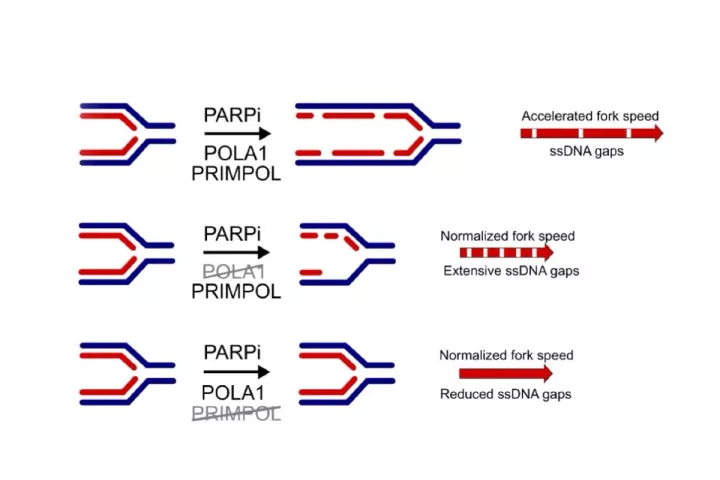Scientists from the Genome Integrity Lab have announced a significant discovery that could greatly improve the treatment of certain types of cancer in the future. In their work, published at the end of August in the prestigious international journal Nature Communications, they revealed a new molecular target for cancer therapy in certain hereditary forms of cancer, typically breast and ovarian cancer.
The published research focused on the process of DNA replication in normal and cancer cells. Before any cell, including healthy ones, divides, it must replicate (or "double") all of its genetic information stored in DNA. During replication, two identical DNA molecules are formed, allowing genetic information to be copied and passed on to daughter cells.
What Happens During DNA Replication
"DNA is stored in the cell as a double-stranded helix, and during DNA replication, these strands unwind and separate, forming what's called a Y-shaped replication fork. Each of the separated strands then serves as a template for creating a copy of the original DNA. If an error occurs during this process, various enzymes recognize and repair the damaged site," explains the corresponding author of the publication, Pavel Moudrý, from the Genome Integrity Laboratory of the Institute of Molecular and Translational Medicine (IMTM) at the Faculty of Medicine of Palacký University, part of the National Institute for Cancer Research (NICR).
One of these enzymes is PARP, which is responsible for basic error repair during DNA replication. Drugs used for certain forms of cancer, such as those containing the active ingredient olaparib, block the activity of PARP, preventing the repair of these simple damages. Other cellular repair mechanisms, including the BRCA1 and BRCA2 enzymes, must step in. However, in many tumors, these may not function due to mutations in the relevant genes. "If a cancer cell has non-functional BRCA1/2 genes, it means that after applying drugs that inhibit PARP activity, it no longer has any backup mechanisms to repair the damaged DNA. In most cases, such a cancer cell dies," adds Pavel Moudrý.
DNA Replication as a Wall-Building Process
According to experts, the process of DNA replication, monitoring its speed, and repair mechanisms can be likened to building a wall. "Imagine DNA replication as a bricklayer building a wall. PARP acts as an assistant, monitoring the bricklayer’s work and telling him when to slow down, when the wall is becoming uneven, or when a row of bricks needs to be torn down and fixed. If the assistant is suddenly 'inhibited,' the bricklayer continues working quickly, but the wall becomes increasingly crooked. In normal cells, there's still a supervisor – BRCA1/2 – who checks the progress from time to time and steps in to fix any problems. However, cancer cells with mutations don’t have such a supervisor, so the bricklayer builds without control until the wall eventually collapses. In our case, this means the cell dies," explains Martin Mistrík, head of the Genome Integrity Laboratory at IMTM LF UPOL, part of NICR.
The Faster, the Worse for Cancer
"Our new research builds on previous work by Dr. Moudrý from our laboratory, which found that blocking PARP activity accelerates DNA replication in cells. The high replication speed of cancer DNA is an important factor in eliminating cancer cells. We were interested in what specifically is responsible for this acceleration, and we managed to identify one of the factors: DNA polymerase alpha," explains Zuzana Machačová, the first author of the publication from the Genome Integrity Laboratory at IMTM LF UPOL, part of NICR. "The principle behind PARP inhibitors is the accumulation of more and more breaks and gaps in the replicating DNA strand, which must be repaired. This presents a major challenge for cancer cells, as alternative repair pathways are often defective in them," adds Zuzana Machačová.
In further research, the authors systematically turned off individual enzymes that could theoretically contribute to the acceleration of DNA replication in the presence of PARP inhibitors, and they identified DNA polymerase alpha.
A New Discovery Highlights the Societal Importance of Fundamental Cancer Research
"The published work provides important insights into the highly complex process of DNA replication. Thanks to this research, DNA polymerase alpha has become a new, potentially significant therapeutic target, especially for treating tumors with mutations in the BRCA1/2 genes – typically breast, ovarian, and other cancers. In follow-up research, our teams will focus on studying anti-cancer agents that inhibit this enzymatic complex," explains Marián Hajdúch, director of the Institute of Molecular and Translational Medicine at Palacký University and medical director of NICR. "This work is also a clear example of how basic cancer research leads to discoveries with broad societal significance, which can quickly be applied in treating patients who, until now, medicine could only partially help, significantly improving their outcomes," adds Marián Hajdúch.
Article:
www.nature.com/articles/s41467-024-51667-1
Contact:
Peter Vanek
Institute of Molecular and Translational Medicine Palacký University
E: peter.vanek@upol.cz | M: 775 050 355
Ondřej Hušek
National Institute for Cancer Research
E: ondrej.husek@garmedis.com | M: 724 773 489


The National Cancer Research Institute project (No. LX22NPO5102) is funded by the European Union – Next Generation EU, under the National Recovery Plan, through the EXCELES program for supporting excellence in research in priority areas of public interest in healthcare, managed by the Ministry of Education, Youth, and Sports of the Czech Republic.

